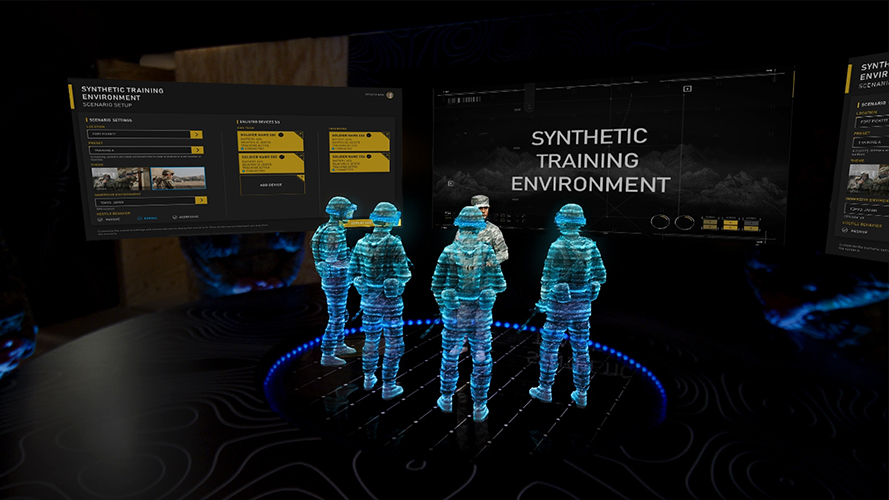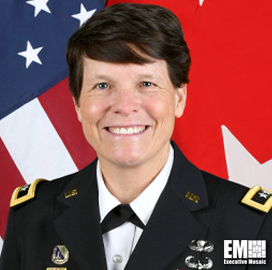Maj. Gen. Maria Gervais, director of Synthetic Training Environment (STE) Cross-Functional Team (CFT) with Army Futures Command (AFC), served as a keynote speaker at Potomac Officers Club’s Future Virtual Battlefield Event on Wednesday, July 22nd.
If you missed the virtual event, you can still register to watch the footage in Potomac Officers Club’s Event Archive.
Greg Wenzel leads the Army business as executive vice president of Booz Allen Hamilton and recently received a 2020 Wash100 Award. Wenzel served as the introductory speaker at the event as well as the moderator of the expert panel.
He provided a brief overview of Gervais’ qualifications, skills and experience before she took the virtual podium. Wenzel stated: “Train as you’re going to fight… with the virtual battlefield, there is an opportunity to fight the battle ten times before you even get boots on the ground.”

Gervais began her keynote address by discussing how training within the defense department must shift to remain equipt for the future of warfare. Within STE CFT, she stated that the division’s goal is to first focus on training and methodology as opposed to material solutions.
“We first have to change our thinking, then we have to advance technology, to truly revolutionize training. We have to move away from evolutionary and incremental improvements,” Gervais stated.

In order to achieve this goal, the STE CFT will begin to leverage the $120+ billion gaming and telecommunications industry to move toward the cutting edge of emerging technologies and innovations. Gervais added that the U.S. Army will make modifications to this technology to meet the service branch’s requirements.
“What we’re seeing today is that we can take advantage of the virtual gaming industry and modify it slightly to meet Army needs and change the way we move,” Gervais emphasized.
Gervais further explained how the U.S. Army would advance to the “cutting edge” of emerging technologies. She discussed the phased approach that will enable the service branch to advance its offerings. First, the Army will investigate new technologies, then assess how it could be modified to meet regulations and finally assess how to integrate the new solutions.
She then discussed the challenges within her division. Gervais referred to a quote from Albert Einstein: “We cannot solve our problems with the same thinking we used when we created them.” Gervais drew comparisons between his quote and the struggles within the U.S. Army.
“We do not understand what solutions are in the realm of the possible. That is why we have to partner with the industry and academia as well as utilize a soldier-centered methodology to advance technology. Once we get the soldiers on the frontend, explaining the problem, then we can understand how to use and embrace that technology to fully understand the challenge,” Gervais explained.

Gervais specifically discussed the STE’s goals and initiatives, noting that the future of Army training will utilize the same methodology as the iPhone operational approach. During her analogy, she noted that while the iPhone only had eight original applications, when Apple launched its app store, it introduced users to 500 new apps within days, and currently has over 2 million apps for users.
For STE information systems, Gervais stated that the division will integrate the same philosophy and launch three applications, including Training Simulation Software, One World Terrain and the Training Management Tool.
Gervais used the analogy of a gaming system when describing the Training Simulation Software, driving simulations. The One World Terrain will integrate 3D terrain into the Army’s simulations. It will provide one standard format across all simulations and virtual training grounds. The Training Management Tool will enable the defense units to plan, maintain and execute soldiers’ training.
With the new tools, the Army will move toward a software centric world with common standard data and terrain, as well as integrate a modular open system architecture.
 “We want to do this to merge live virtual constructive into a common training environment. The challenge and reason we have to move to this is that we took 80s and 90s technology and spent our time trying to integrate them into a modern data platform, but it had a high overhead, long lead times, etc. We cannot deliver training to a point of need.
“We want to do this to merge live virtual constructive into a common training environment. The challenge and reason we have to move to this is that we took 80s and 90s technology and spent our time trying to integrate them into a modern data platform, but it had a high overhead, long lead times, etc. We cannot deliver training to a point of need.
This synthetic training environment will increase reps and sets to work on skill sets, so when we go into a particular environment, we are much more equipped to work efficiently. You get 25 bloodless battles before the first battle. You’re honing your cognitive skills so that when you go into your first battle, it may not be the very first– you have that trust, confidence and realism,” Gervais explained.
Moving forward, Gervais noted that the STE will focus on autonomy, robotic and artificial intelligence (AI), speed and scale, and dissemination of information. She then addressed the industry. She said that industry partners will help address scale and the ability to manage a massive amount of data.
Data management will also serve as a joint project between the public and private sectors, including 3D terrain and automated training. She concluded by discussing the offices and divisions of STE where the industry can share their ideas and integrate them into the Army.
“This is what’s going to help us more than anything else to become more innovative today and as we move toward the future,” Gervais concluded.
In case you missed the event, click here to replay Potomac Officers Club’s Future Virtual Battlefield Event.
Mark your calendars for Potomac Officers Club’s 5th Annual Army Forum on Thursday August 6th. Bruce Jette, assistant secretary of the Army for Acquisition, Logistics, and Technology (ASA(ALT)) and 2020 Wash100 Award recipient, will serve as the keynote speaker at the forum.
During the 5th Annual Army Forum, Jette will discuss the progress, innovations and accomplishments of the Army’s modernization renaissance over the last year, what challenges remain, and how industry can help in 2021 and beyond.
Register here to join Potomac Officers Club for the 5th Annual Army Forum on Thursday, Aug. 6th to learn more about the latest initiatives and modernization plans for the U.S. Army.








